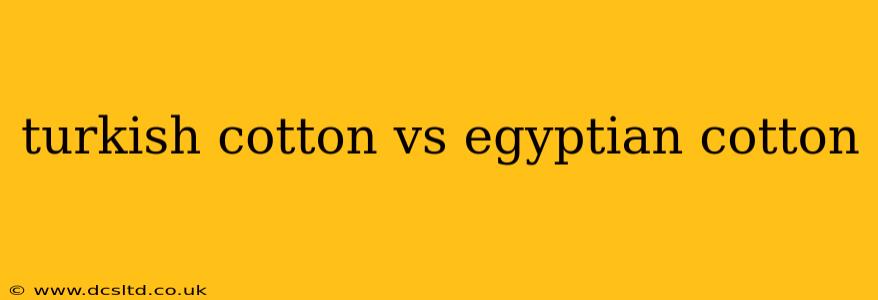Choosing the right bedding can significantly impact your sleep quality and overall comfort. Two names consistently top the luxury bedding list: Turkish cotton and Egyptian cotton. While both are renowned for their softness and durability, key differences exist that influence their feel, price, and longevity. This comprehensive guide delves into the nuances of Turkish and Egyptian cotton, helping you make an informed decision for your next bedding purchase.
What is Egyptian Cotton?
Egyptian cotton, particularly the extra-long staple (ELS) variety, is celebrated for its exceptionally long fibers. These longer fibers contribute to its renowned strength, softness, and lustrous sheen. The length allows for finer yarns to be spun, resulting in a smoother, more luxurious fabric with a higher thread count. Egyptian cotton's reputation is built on its superior quality, which translates to a higher price point.
What is Turkish Cotton?
Turkish cotton, often referred to as "long staple" cotton, also boasts relatively long fibers, though generally shorter than the ELS fibers of Egyptian cotton. This doesn't automatically make it inferior; Turkish cotton excels in its absorbency and breathability. It's known for its durability and softness, often described as having a slightly more plush feel than Egyptian cotton. Furthermore, Turkish cotton is frequently treated with special processes to enhance its softness and resilience. The cost is generally lower than Egyptian cotton.
What are the Key Differences Between Turkish and Egyptian Cotton?
This section directly addresses the core distinctions between these two popular cotton types:
Fiber Length:
- Egyptian Cotton: Generally features extra-long staple (ELS) fibers, typically exceeding 1 3/8 inches (35mm). This contributes to its exceptional strength and softness.
- Turkish Cotton: Possesses long staple fibers, but usually shorter than Egyptian cotton, leading to a slightly less luxurious feel, though still exceptionally soft.
Durability:
- Egyptian Cotton: The long fibers translate to higher durability, meaning the sheets will last longer with proper care.
- Turkish Cotton: While not as durable as Egyptian cotton, Turkish cotton sheets are still quite long-lasting, especially when treated with modern processes that improve their resilience.
Softness:
- Egyptian Cotton: Renowned for its incredible softness, attributed to the longer fibers and smoother yarn.
- Turkish Cotton: Offers a very soft feel, often described as slightly more plush than Egyptian cotton. The softness is frequently enhanced by post-production treatments.
Absorbency:
- Egyptian Cotton: Highly absorbent, making it ideal for hot sleepers.
- Turkish Cotton: Also highly absorbent, often boasting superior absorbency compared to some Egyptian cotton varieties.
Price:
- Egyptian Cotton: Generally more expensive due to the higher quality and longer fibers.
- Turkish Cotton: Usually more affordable than Egyptian cotton, making it a great value option for luxurious bedding.
Sheen and Lustre:
- Egyptian Cotton: Possesses a characteristic lustrous sheen.
- Turkish Cotton: Can also have a nice sheen but often slightly less pronounced than Egyptian cotton.
Which is Better: Turkish or Egyptian Cotton?
There is no single "better" option; the ideal choice depends on individual preferences and priorities. Egyptian cotton offers unsurpassed luxury and durability but comes with a higher price tag. Turkish cotton provides exceptional softness, absorbency, and value for the money.
How to Care for Turkish and Egyptian Cotton Sheets?
Proper care is essential for extending the lifespan of both types of cotton sheets. Generally, both benefit from gentle machine washing in cold water with a mild detergent. Avoid harsh chemicals and bleach. Air drying is preferred to preserve the fibers and prevent shrinkage, but low-heat tumble drying is acceptable.
Are there other types of cotton besides Turkish and Egyptian?
Yes, many other types of cotton exist worldwide, each with its unique qualities. Pima cotton, Supima cotton, and Sea Island cotton are other examples of high-quality long-staple cottons often used in luxury bedding.
What is the best thread count for cotton sheets?
While higher thread counts are often associated with softer sheets, this isn't always the case. Thread count alone doesn't define quality; fiber length and the way the yarn is spun are equally important. A higher thread count can sometimes feel stiff and less breathable. Look for a balance that suits your comfort preferences. A range between 300 and 600 is often considered ideal.
This detailed comparison aims to provide a comprehensive understanding of Turkish and Egyptian cotton, allowing you to make an informed choice based on your budget and preferences. Both offer exceptional quality and comfort, making them excellent choices for luxurious bedding.
